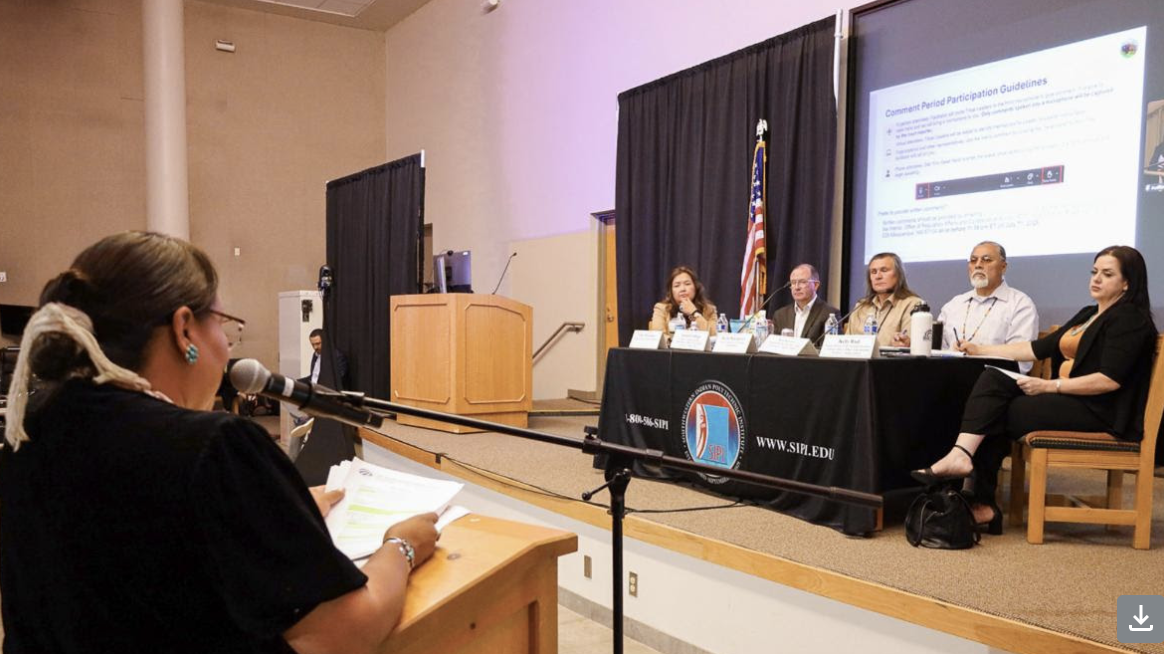
- Details
- By Native News Online Staff
On Tuesday, members of the 25th Navajo Nation Council took part in a tribal consultation hosted by the U.S. Department of the Interior’s Indian Affairs Workforce Efficiency and Productivity initiative at the Southwestern Indian Polytechnic Institute in Albuquerque, N.M. During the meeting, they emphasized the importance of maintaining meaningful tribal consultation and ensuring continuity of essential services.
Speaker Crystalyne Curley advocated for sustained federal investment in key programs, notably the PL 102-477 Workforce Development Program and the finalization of the Office of Navajo Hopi Indian Relocation (ONHIR). She also highlighted the need for forward funding of the Johnson-O’Malley Program, support for the Indian Self-Determination and Education Assistance Act, mandatory funding for the BIA 105(l) Lease Program, reforms to the BIA Homesite Lease process, and more efficient National Environmental Policy Act (NEPA) compliance.
Additionally, Speaker Curley called for federal support of the Navajo Division of Child and Family Services’ 477 Plan, which is designed to streamline bureaucracy, enhance coordination of services, and empower families through job training, education, childcare, and culturally rooted healing programs.
“We call on DOI to ensure no agency under a 477 plan is eliminated. Doing so would violate the statute and undermine tribal self-determination,” she said.
Noting ONHIR’s funding will expire at the end of the fiscal year, Speaker Curley stated, “The Nation’s position is clear: ONHIR must stay open until its work is complete. We are open to negotiating closure terms that ensure relocatees are served, the remaining 13,000 acres are selected, and obligations are properly transferred.”
On education, she called for forward funding of the Johnson-O’Malley Program. “Some districts on the Nation haven’t received their 2024-2025 payments, even as the school year ends,” she said.
Speaker Curley also pressed Congress to make 105(l) lease payments mandatory to ensure tribes receive consistent facility funding.
“This protects health, education, and safety funds from being displaced and supports long-term planning,” she added.
To improve homesite leasing, she urged BIA collaboration on reforms, including better staff training on Trust Asset and Accounting Management System data standards, which would help track and improve processing times.
More Stories Like This
Native News Weekly (August 25, 2024): D.C. BriefsNative Bidaské: The Illusion of Freedom and the Myth of America 250, Leonard Peltier Speaks Out
Monday Morning (March 2, 2026): Articles You May Have Missed This Past Weekend
Native News Weekly (March 1, 2026): D.C. Briefs
Scope Narrowed, Report Withheld: Questions Mount Over Michigan Boarding School Study
Help us defend tribal sovereignty.
At Native News Online, our mission is rooted in telling the stories that strengthen sovereignty and uplift Indigenous voices — not just at year’s end, but every single day.
Because of your generosity last year, we were able to keep our reporters on the ground in tribal communities, at national gatherings and in the halls of Congress — covering the issues that matter most to Indian Country: sovereignty, culture, education, health and economic opportunity.
That support sustained us through a tough year in 2025. Now, as we look to the year ahead, we need your help right now to ensure warrior journalism remains strong — reporting that defends tribal sovereignty, amplifies Native truth, and holds power accountable.
 The stakes couldn't be higher. Your support keeps Native voices heard, Native stories told and Native sovereignty defended.
The stakes couldn't be higher. Your support keeps Native voices heard, Native stories told and Native sovereignty defended.
Stand with Warrior Journalism today.
Levi Rickert (Potawatomi), Editor & Publisher


